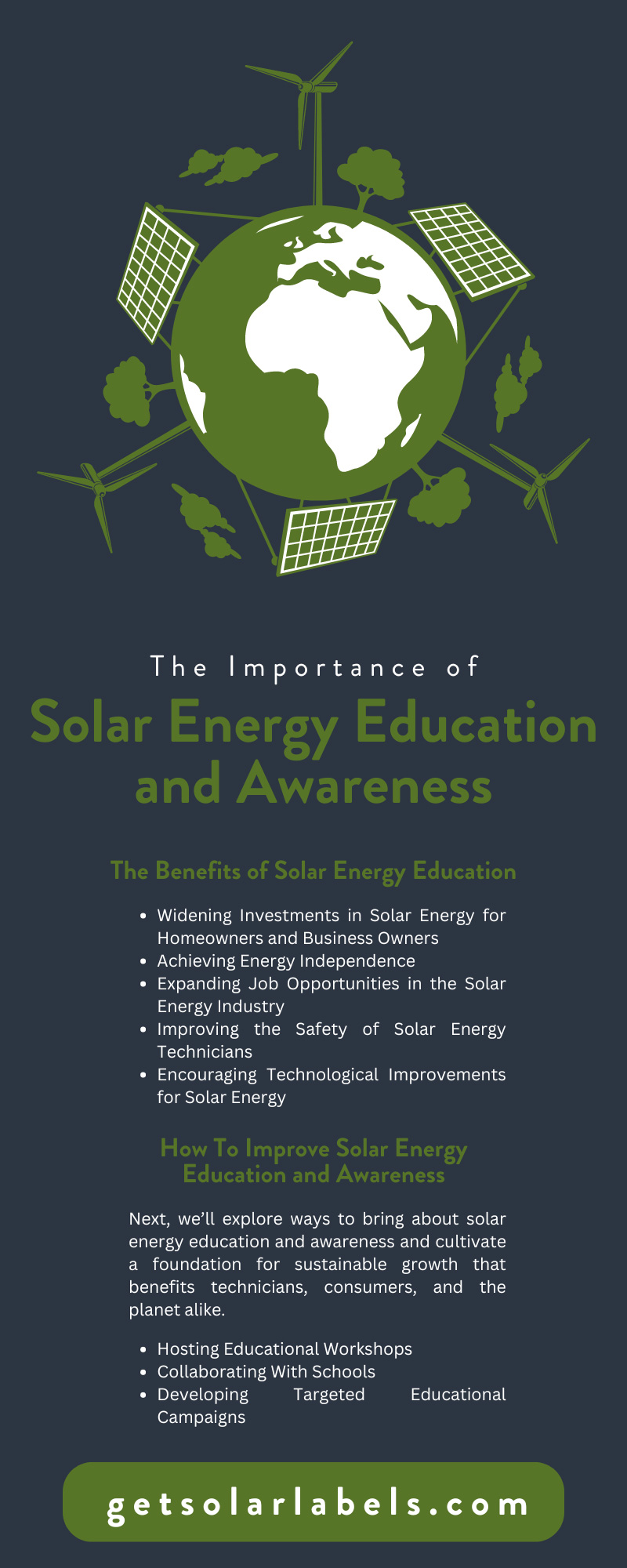May 16th 2024
The Importance of Solar Energy Education and Awareness
Solar energy stands at the forefront of sustainable solutions. It’s powerful enough to mitigate the global energy crisis. Nevertheless, it cannot make a difference without widespread understanding and implementation.
The evolution of solar technology and its integration into daily habits falls behind due to a lack of knowledge. Continue reading to deepen your understanding of the importance of education and awareness among the public for solar energy.
The Benefits of Solar Energy Education
Widening Investments in Solar Energy for Homeowners and Business Owners
The shift toward solar energy represents a crucial step toward a more sustainable and environmentally friendly future. An increasing awareness of the environmental impact of traditional energy sources and a growing understanding of the long-term economic benefits of solar power drives this transition.
Solar energy, unlike fossil fuels, produces no greenhouse gases or pollutants. For homeowners looking to reduce their carbon footprint, the investment in solar panels offers significant electricity bill savings over time.
Businesses can benefit from large-scale solar installations to reduce operating costs and showcase a commitment to the environment. As more companies adopt solar energy, the demand for solar technology increases. It drives innovation and creates a virtuous cycle that makes solar energy more accessible and appealing to a wider audience.
Achieving Energy Independence
Harnessing solar energy stands as a powerful catalyst for achieving energy independence for individuals and nations alike. Nations that invest in solar infrastructure can secure a sustainable and domestic energy source, bolstering economic stability and national security. The pivot toward solar power not only fosters self-reliance but also stimulates local economies through job creation in the burgeoning clean energy sector.
Expanding Job Opportunities in the Solar Energy Industry
With a higher demand for solar energy comes the creation of jobs. It is vital to invest in educational programs and training opportunities that can equip individuals with the required knowledge and skills to ensure the sector’s sustainable growth.
Creating more educational pathways is essential to attracting new talent into the field. Specialized courses in vocational schools, community colleges, and universities, as well as offering certifications in solar technology installation, maintenance, and innovation, will prove effective. Such programs should cover a broad spectrum of topics, from the basics of photovoltaic (PV) systems to more advanced subjects such as grid integration and smart technology applications.
Additionally, raising awareness about the career opportunities within the solar energy industry can also increase interest and participation. Campaigns showcasing the potential for job growth, the importance of a sustainable future, and the diverse roles within the field can inspire a new generation to join the solar workforce.
Improving the Safety of Solar Energy Technicians
Expanding the solar energy industry requires education and proper training. It’s the only way technicians can safely install and maintain solar energy systems for homes and businesses.
Get Solar Labels is a resource for businesses and homeowners to improve the safety of their solar energy systems. We offer National Electric Code (NEC) approved engraved solar labels made to caution technicians about PV power sources, AC battery disconnect locations, and more.
The occupation involves inherent risks, such as working at heights, handling electrical components, and exposure to the elements. The key is education. Technicians must go through sufficient training to understand what these terms mean and how to safely conduct themselves in this type of work environment.
Encouraging Technological Improvements for Solar Energy
A well-educated workforce is more likely to drive technological advancements, finding innovative solutions to increase efficiency and reduce costs in solar installations. This, in turn, can make solar energy more accessible and appealing to a broader audience, further accelerating its adoption.
The expansion of technology in the solar energy sector, fueled by a skilled and safety-conscious workforce, presents an opportunity for significant economic and environmental impact. The pace of innovation is likely to increase.
This could lead to the development of new solar technologies that capture energy more efficiently, are easier to install, or are made from more sustainable materials. In essence, prioritizing education for prospective and existing technicians is an investment in the industry’s future.
How To Improve Solar Energy Education and Awareness
Next, we’ll explore ways to bring about solar energy education and awareness and cultivate a foundation for sustainable growth that benefits technicians, consumers, and the planet alike.
Hosting Educational Workshops
Hosting solar energy workshops and webinars engages different groups—homeowners, business owners, educators, students, and community members interested in solar energy. A comprehensive and interactive look into solar energy should cover its advantages, technology, financing, and government incentives.
These workshops are beneficial for many reasons. They give homeowners and business owners insights into solar energy systems’ assessment, installation, and maintenance. Educators and students receive information useful for learning or career development. They also help community members who are curious about solar energy by dispelling myths and clarifying misconceptions about its accessibility and efficiency.
These workshops and webinars are platforms for knowledge exchange and networking. They make space for questions, sharing experiences, and opportunities for collaboration. Attendees leave with a better understanding of solar energy’s impact on climate change, sustainability, and energy independence.
Collaborating With Schools
Partnering with schools is a crucial step that can further boost solar energy education. By introducing children to renewable energy concepts like solar power through interactive learning, we can integrate solar topics into the curriculum to ignite student interest and curiosity. This effort nurtures a generation more aware of their energy choices and environmental impact.
School collaborations could lead to educational programs featuring hands-on projects, such as small-scale solar installations or science fair competitions centered on renewable energy. These initiatives educate and inspire students by demonstrating the tangible benefits of solar power. By investing in solar energy education within schools, we can cultivate a society that values and prioritizes renewable energy, paving the way for a more sustainable future.
Developing Targeted Educational Campaigns
Workshops and school opportunities bring awareness to a select few groups of age groups. To expand solar energy knowledge to the general public, other businesses, and policymakers, consider establishing targeted educational campaigns.
It’s a marketing tactic that designs informational messages that resonate with each audience. Homeowners can learn how solar energy reduces household utility bills, while businesses can discover the long-term benefits of energy independence.
By providing clear, concise, and compelling information, targeted educational campaigns empower individuals and organizations. This information enables them to make informed decisions about investing in solar energy, thus accelerating its adoption and contributing to a more sustainable world.
Get Solar Labels wants to be involved in the evolution of the solar industry. We offer durable placards that update to consistently meet NEC standards. When you purchase a solar label from our company, you can trust that you’re improving the safety of technicians and the future of solar energy.


